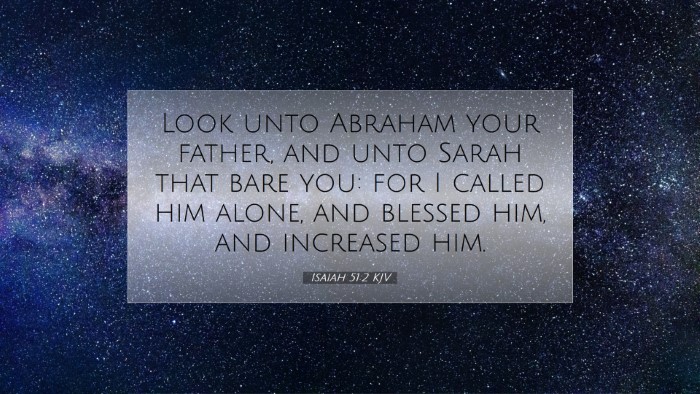Commentary on Isaiah 51:2
Verse Text: "Look unto Abraham your father, and unto Sarah that bare you: for I called him alone, and blessed him, and increased him."
Introduction
Isaiah 51:2 presents a profound encouragement for the people of Israel, reminding them of their origins and the promises made to their ancestors. This verse serves as a pivotal point in which God calls His people to reflect on His faithfulness through the lineage of Abraham and Sarah. The commentaries of Matthew Henry, Albert Barnes, and Adam Clarke provide valuable insights that delve into the theological and practical implications of this call. Below, we explore these insights to aid pastors, students, theologians, and Bible scholars.
Contextual Analysis
This passage occurs in a section of Isaiah that emphasizes comfort and assurance amidst despair. God's people, exiled and oppressed, are reminded of their great heritage—a heritage that originated with a divine call and promise to Abraham and Sarah. Understanding the context is critical as it highlights God's unchanging nature and His enduring covenantal relationship with His people.
Insights from Commentaries
Matthew Henry's Commentary
Henry emphasizes the call to remember the faithfulness of God. In his analysis, he points out that God's calling of Abraham was not merely for Abraham's benefit but for the entire nation descending from him. The focus on Abraham and Sarah serves to underline the:
- Unilateral nature of God's covenant: Henry highlights that God called Abraham "alone," signifying that the friendship and favor of God is not based on human merit, but solely on divine grace.
- Example of faith: Abraham's trust in God's promises, despite his circumstances, sets a foundation for faith for all generations.
Albert Barnes' Notes on the Bible
Barnes provides a lexical analysis that reflects on the terms "look unto" as an imperative for the people to actively consider their roots. He notes that:
- The significance of the patriarchs: Barnes underscores how Abraham and Sarah's stories illustrate not only faithfulness but also God's ability to create a great nation from seemingly impossible circumstances.
- Encouragement amidst trials: The historical assurance that God took a couple with advanced age and no children and made them into the progenitors of many nations serves as a metaphor for hope and restoration for Israel.
- Increased blessings: Barnes highlights God's promise to "bless" and "increase," reflecting God's ongoing desire to multiply and prosper His people.
Adam Clarke's Commentary
Clarke offers an intimate exploration of Abraham and Sarah's relationship with God. He points to several themes:
- Divine Initiative: Clarke emphasizes that God’s calling of Abraham was an act of mercy to a man who was previously in idolatry, reflecting God’s power to call the unworthy into His service.
- Faith's foundation: He argues that Abraham’s relationship with God is foundational for understanding righteousness by faith, emphasizing the importance of looking back to our spiritual ancestry for strength and guidance.
- Symbolism of Sarah: The reference to Sarah is noted as significant because, through her barrenness and miraculous pregnancy, she symbolizes the transformative power of faith in the face of human limitations.
Theological Implications
Isaiah 51:2 has significant theological implications for understanding covenant theology and the nature of God’s promises. Within the context of the Israelite exile, there are several key points to consider:
- Remembrance of Heritage: The verse encourages believers to remember their heritage, drawing strength from the past to navigate present struggles.
- The Covenant Community: God's choice of Abraham and Sarah reflects His sovereign will and establishes a loving relationship with a chosen community, which includes all who have faith.
- Hope in Despair: The promise of increase to those who seemingly have little offers hope that challenges, trials, and even lack can be transformed through faith.
Practical Applications
The reflections on Isaiah 51:2 provide essential applications for faith communities today:
- Mental Focus on God: The directive to "look unto" invites believers to focus their minds and hearts back to God’s providence and promises.
- Encouragement in Leadership: Pastors and leaders can seek to encourage their congregations by reminding them of their identity rooted in God's call and blessings through their spiritual heritage.
- Living by Faith: Just as Abraham and Sarah exemplified profound faith amidst uncertainty, modern believers are called to trust in God's plans, which may not always align with human expectations.
Conclusion
Isaiah 51:2 serves as a powerful exhortation for believers to reflect on their heritage in the faith. The insights provided by Matthew Henry, Albert Barnes, and Adam Clarke collectively encourage a deeper understanding of God’s character, His unwavering faithfulness, and His extraordinary ability to fulfill promises. In a world that often seeks to drown out the voice of hope, this passage reaffirms that looking towards our spiritual forebears can illuminate paths forward, propelling God’s people from despair to renewed faith and action.


